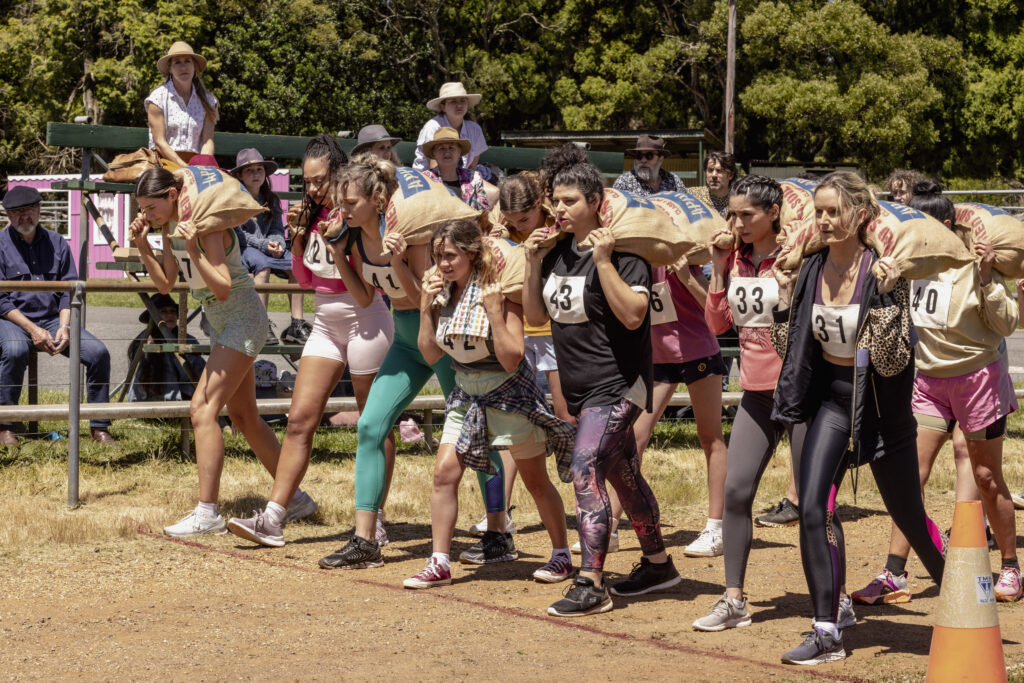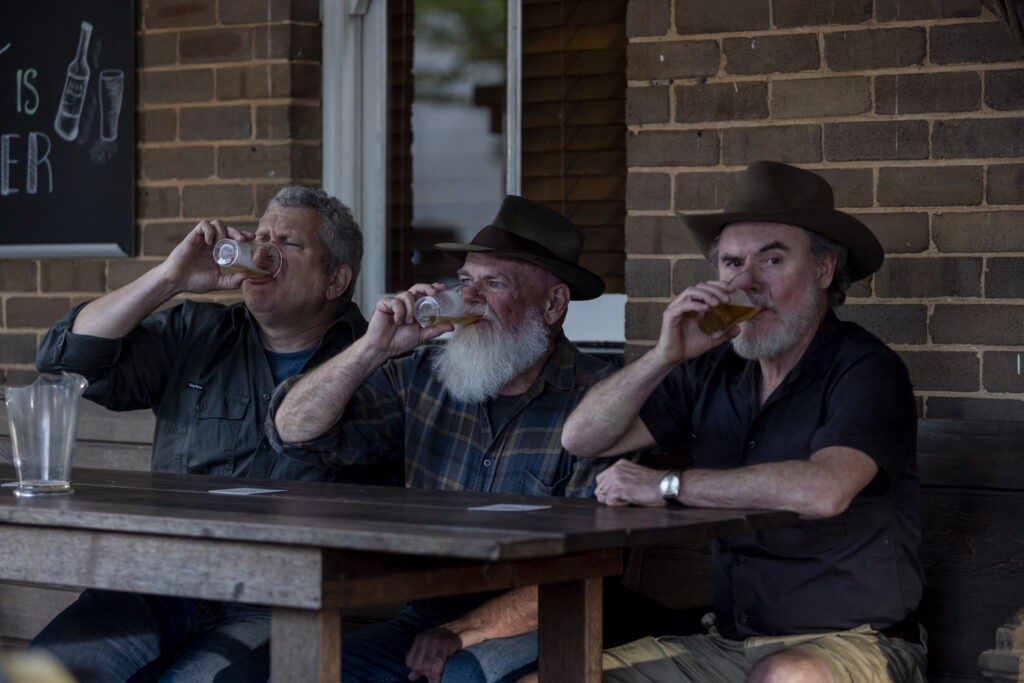Were you lucky enough to see the play of The Appleton Ladies’ Potato Race as it has toured Australia over the last few years? Written by former Canberra resident Melanie Tait, it’s a heart-warming, funny, feminist saga about a culture war in a small town.
And tomorrow Wednesday (26 July) the movie of the play premieres at 7.30pm On 10 And 10 Play. Or, you can stream on Paramount+ from the following day.
BroadAgenda editor, Ginger Gorman, chatted with Melanie about the “bullshit” gender pay gap (among many other things!)
For those of us who have fuzzy brains, briefly remind us of the plotline of The Appleton Ladies’ Potato Race and what inspired it?
Dr Penny Anderson (played by Claire van der Boom) returns to her home town to discover the event of the year – The Appleton Potato Race – has $2000 prize money for the blokes, and $200 for the women. It’s inspired by something similar happening in my home town, Robertson.
This is your first movie. What a big deal! Congratulations. How did it come about?
Thanks Ginger! When I was a kid growing up in Robertson, if you’d have told me that one day I’d have anything to do with a movie, let alone write one, I’d have been stoked.
The film is based on a play I wrote for Ensemble Theatre in 2019. It was an incredible production directed by Priscilla Jackman and starring Valerie Bader, Merridy Eastman, Sapidah Kian, Amber McMahon and Sharon Millerchip. The play was a dream – it was critically received well, sold out before it opened (ah, pre-covid theatre times…!) and went on to tour Australia.
Independent producer Andrea Keir read it, then came to see it and wanted to make it into a film. Usually these things take years, I’m told. Within three weeks of having the rights to the play, Andrea had a deal with Paramount+ and the movie was on its way.
Appleton Ladies Potato Race – Trailer.
I understand you wrote the script. Was it hard to write for TV (as opposed to the stage)? What other differences were there in the creative process?
Initially the network didn’t want me to write the screenplay, having some pretty ancient views on the ability of playwrights to write for the screen (not sure where this comes from – most of our great screenwriters have been in theatre at some stage in their careers), but producer Andrea fought hard for me to do the job, and Paramount+ ended up supporting me with a mentor, the brilliant screenwriter and novelist Kylie Needham (who went on to be our Script Editor on the film).
I learned so much about the process. For example, because we were under such a tight deadline, I couldn’t understand why the network wanted me to write a ‘treatment’ (a lengthy document telling the story of the film) instead of just kicking on with the screenplay. I’ll forever be grateful to Rick Maier from Paramout+ and Channel 10 for insisting on it and teaching me what an important tool it is. Once the treatment was written, it was like a blueprint for the script and I found it smoother work.
Still, a film is much tougher on the artistic ego and vision of the writer than theatre is. At least it was for me in this process. In theatre, the playwright is consulted on most things when a play is being developed and brought into production. We tend to have a say in the team around us – who the director is, the key cast etc.
In film, I handed over the script and that was pretty much it – I wasn’t even at a table read-through and was only ever on sit as a visitor, not an active part of the artistic process.
It was my first time working on a film, and I think we tend to think that, when doing something for the first time everyone around us knows better. I’m not entirely sure that’s true, and if I get to make another film I want to be much more involved. Ultimately, the world of The Appleton Ladies’ Potato Race comes from my imagination, so I think I have a lot to contribute.
That said: both theatre and film are incredibly collaborative and everyone brings their unique set of skills and vision to make the whole.

The Appleton Ladies’ Potato Race: The women line up to race. Picture: Lisa Tomasetti
Folks in Robertson – your hometown and the place that inspired Potato – were super excited that parts of the movie were filmed there. How do they feel about the movie coming out? What has the reaction been like? (Not everyone was stoked when the real events took place, and you were campaigning for equal prize money back in 2018).
I hope they’re excited! So many people from Robbo contributed to the movie – as extras, with locations etc. I really hope they enjoy it.
Editor’s note: read about events that inspired the original play here.
Not that we want to name drop. But let’s name drop. You’ve got some extraordinary Aussie actors in the cast. Who are they and what was it like to work with them?
There’s some incredible actors in this movie. I feel like in Robyn Nevin and Tiriel Mora we’ve got half the cast of the Aussie classic The Castle reuniting! I’m scared to single anyone out because they’re all so great.
And what about the director? How did you work together with her and other members of the creative team?
About 15 years ago, the director Lynn Hegarty and I were put together by our then agent to work on a film project together – I ended up getting a traineeship journo job at the ABC in Darwin and left Sydney so our film died – so it really seemed right that Lynn came in to direct the movie. We spent a couple of days together in Melbourne before the beginning of pre-production, which was great.
Like I said, I wasn’t really involved after that, but I’m really grateful to Lynn for sticking almost to the letter to the script. She fought hard for a bunch of things that meant a lot to the story and my vision for the film.
The other really essential part of the creative team was editor Katie Flaxman. Katie and I have been close friends since our early twenties, so I was really able to talk a lot of the process through with her.
What do you want folks to take away from the film?
That the gender pay gap is absolute bullshit, whether it’s at the local show or it’s in the management structure at your office. The only way we change things is by speaking up, organising and actually doing something about injustice.
That potato racing is a great sport, full of extraordinary skill, speed and strength!
We’ve seen a big push in the last six months – especially from actors like Bryan Brown – for Australian content quotas for streaming services. Why do you think it’s so important to tell Aussie stories (like this one).
It’s essential! The two shows that influenced me most growing up as a person, and as an artist were A Country Practice and Brides of Christ. A Country Practice, in particular, really taught me about the world around me, the challenges in our society and what being a decent member of a community was. As an adult, I’ve gone back and watched it (and made a podcast about it!) and realised it does all that stuff and reflects what was happening in Australia in the eighties – what we cared about, what we were angry about, why we laughed and cried. So, there’s that cultural reflection part. And, it’s funny too, thanks Esme!
There’s also a practical part to making more Australian work. A show like ACP made around 90 hour long eps a year for thirteen years. So annually, that’s 90 directing jobs, 90 screenwriting jobs, 90 lighting director jobs, countless acting jobs etc etc.
And surely, it’s no coincidence that some of the best and most successful Australian films come from this time – when we had actors and creatives constantly practicing their screen skills? The roll call is extensive and there’s so much shared DNA between all of these projects: The Castle, The Man From Snowy River, Muriel’s Wedding, Priscilla Queen of the Desert, Crocodile Dundee, Strictly Ballroom, Romper Stomper, Babe etc.
More Australian stories on screen has such far reaching implications to our culture, our economy and our sense of national worth. Bring back A Country Practice!

The Appleton Ladies’ Potato Race – Darren Gilshenan, John Batchelor, Laurence Coy as Billy. Photo: Lisa Tomasetti
What’s next for you? More films in the works?
I’m working on a bunch of plays at the moment, and two screenplays (one I’m co-writing with the author Yvette Poshoglian – a one woman story machine! – which I’m super excited about). I also have a television series in development with Cecilia Ritchie, who was one of the excellent Executive Producers on The Appleton Ladies’ Potato Race. Hopefully the Potato Ladies does super well and everyone wants to make all my things (including that A Country Practice reboot!).
- Picture at top: The Appleton Ladies’ Potato Race: Claire van der Boom as Penny and Katie Wall as Nikki. Photo: Lisa Tomasetti
Ginger Gorman is a fearless and multi award-winning social justice journalist and feminist. Ginger’s bestselling book, Troll Hunting,came out in 2019. Since then, she’s been in demand both nationally and globally as an expert on cyberhate and the real-life harm predator trolling can do. She's also the editor of BroadAgenda and gender editor at HerCanberra. Ginger hosts the popular "Seriously Social" podcast for the Academy of the Social Sciences in Australia. Follow her on Twitter.





